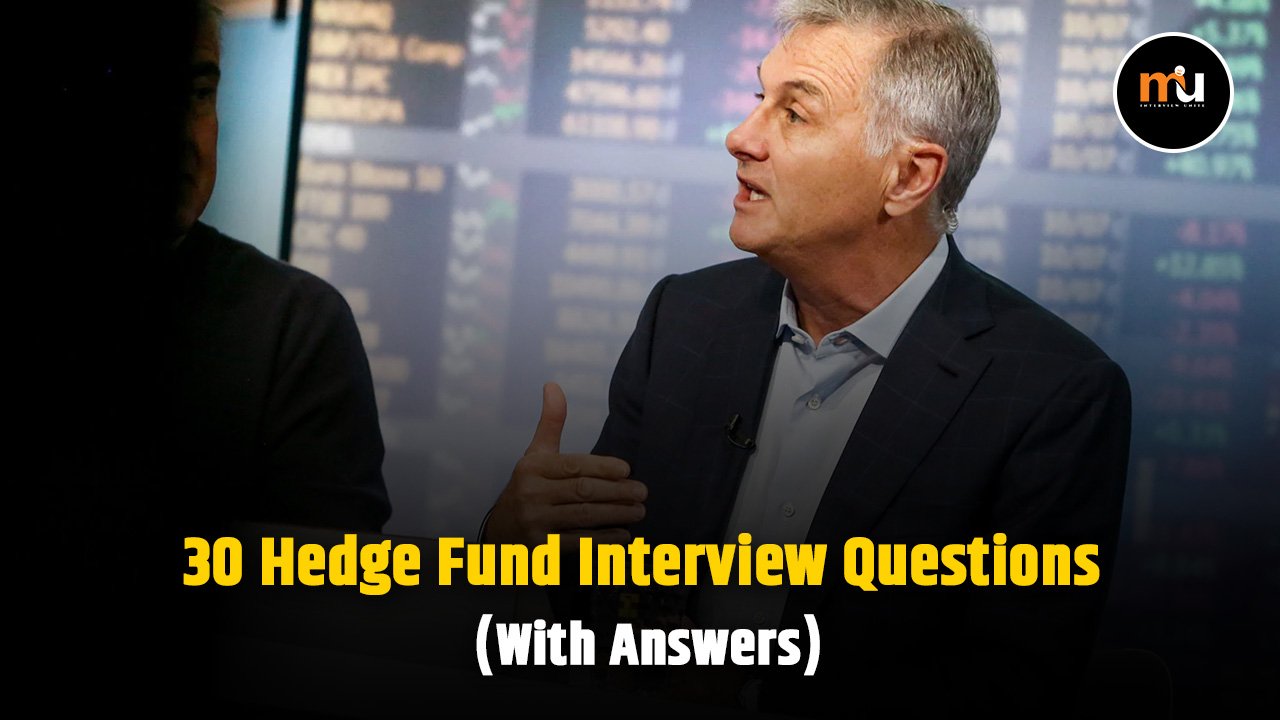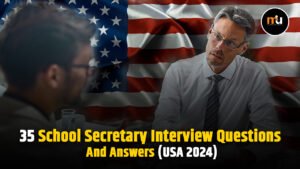Hedge Fund search for the best analytical talent to assist clients manage their investments. The process of getting a job interview is highly competitive and a thorough preparation is essential.
This list of exclusive 30 possible Hedge Fund interview questions, along with examples of answers, offers crucial advice for prospective applicants.
Check these investment strategies and market analysis, valuation and behavioral questions to develop strong responses that demonstrate your quantitative as well as qualitative skills required by Hedge Fund Interview executives during the rigorous interviewing process.
30 Hedge Fund Interview Questions And Answers
1. Why Are You Interested In Working At A Hedge Fund?
Example Answer: I’m attracted to the challenge of thinking about it, a performance-oriented approach, new strategies, and the opportunity to grow assets under my control.
Your fund’s focus on technology sector investments is in line with my experience and interests perfectly.
2. How Do You Evaluate An Investment Opportunity?
Example Answer: that I employ both qualitative and quantitative evaluation. I look at financial statements, valuation multipliers growth trajectories in relation to competitors macroeconomic and technological changes, management team knowledge across both the private and public information channels prior to making investment suggestions.
3. What Investment Approach Best Aligns With This Hedge Fund’s Strategy?
Example Answer: Based on your short and long equity strategy focusing around the financial market I would employ deep fundamental analysis to make targeted, catalyst-driven positions in stocks that are undervalued while also hedge against systematic risk factors.
4. How Would You Value An Early-Stage, Private Biotech Company?
Example Answer: Because financials are not available for private businesses, I’d concentrate on analysis of the size of the market for intellectual capital that can be addressed and the probability of success for phase trials information, implied multiples of similar exits or IPOs and investor financing signals.
5. Where Do You See Opportunities In The Current Market Environment?
Example Answer: A While volatility can bring risks however, it also shakes loose assets that are mispriced. I see opportunities in battered-down small caps with a strong liquidity exposures to inflation. Additionally the senior secured floating rate debt can be used for the defense of rising rates.
6. What Factors Affect The Risk And Return Relationship?
Example Answer: Tenor, leverage, credit quality diversification, liquidity and even volatility all are factors which alter this relationship. Being an investment professional, being able to balance all of these factors helps me adjust an investment portfolio in line with my objectives.
7. How Would You Hedge FX Risk From Global Investments?
Example Answer: Currency Futures and foreign exchange swaps Forex options, and other proxy hedges using the allocation of correlated equity, local-denominated bonds and diversifying exposure to currency across currencies that are negatively correlated and constructively regulating roll yield.
8. What Risks Could A Position In “Growth” Style Public Equities Pose?
Example Answer: exposure to increasing rates, long-term positioning that is crowded susceptible to rapid unwinding, overvaluation relative to the current financial performance.
Growth, however, can’t be based solely on the basis of old-fashioned metrics. The assessment of the size of the market that is addressable and the secular shifts that drive revenue trajectory is crucial.
9. How Do You Evaluate Management’s Capabilities When Investing In A Company?
Example Answer: The management team’s past history of executing strategy and generating shareholder returns gives strong indicators.
However, analyzing their operational efficiency and capital allocation policy control of their balance sheets acquisition of talent and retention, the culture attitudes towards transparency etc. can also reveal their capabilities.
10. What Industry Do You Find Most Interesting Right Now And Why?
Example Answer: The global shift to web3 is captivating. It spans financial technology digital assets Creator economies, models that are decentralized, AI, cryptography and gaming.
Analyzing both opportunities and threats between startups and incumbents with exposure to the market allows for the generation of alpha.
Related More: 25 Barclays Interview Questions And Answers (UK 2024)
11. What Factors Influence Currency Movements?
Example Answer: Policy divergences between nations create the differentials in interest rates that impact currencies.
The flow of capital and trade affect exchange rates in a dynamic manner. The risk of geopolitics, inflation trajectories as well as bond yields and the relative growth outlooks matter enormously.
12. How Would You Construct An Arbitrage Trade?
Example Answer: When similar public companies trade at hugely different multiples, the strategies of trading pairs can be effective.
Capital structure arbitrage is investing in equity with a high value while shorting costly debt. Merger arbitrage by acquiring targets spreads is a good idea. You must hedge your market risk.
13. What Red Flags Would You Look For In An Investment Manager’s Strategy Or Behavior?
Example Answer: Complex strategies, ineffective risks, style shifts in transparency, inadequate communication, insufficient ideas flow diversity and debate and stress testing that is not enough as well as defensive reactions to scrutiny, indecisive commitment to the strength of convictions, regardless of price differences.
14. How Does Your Previous Work Experience Apply To This Senior Analyst Role?
Example Answer: In my previous buying and consulting experiences I developed the financial modeling, valuation, data analysis, and skills in articulation while working under tight deadlines that could be useful in this job. I also have extensive experience that covers industrial and technology sectors relevant to the hedge fund.
15. How Do You Stay Up-To-Date On Financial Markets?
Example Answer: Read annually published reports, participating in conferences for industry using expert networks, synthesizing research on sell side data, speaking with both public and private management teams, conducting channel checks and surveys that are proprietary, running bottom-up models of competitive dynamics and always rethinking my own beliefs.
16. How Would You Respond If An Investment You Recommended Performed Poorly?
Example Answer: I’d be the first to re-examine what had changed relative to my beliefs and the ownership of any mistaken decision. Informational signals are the basis for the future.
I will then provide an honest assessment for an Investment Committee on whether factors were temporary or reflect fundamental weaknesses that are now being baked into the proper valuations.
17. Why Do You Want To Leave Your Current Job?
Example Answer: I’ve learned tremendously from working with top investors from Fund X. However, the high proportion of short-only, low-turnover positions makes it difficult to use my full investment knowledge.
I’m now looking to up my game and analyze diverse, complicated ideas together with my smart colleagues. Your culture is similar to my inclination.
18. How Do You Handle Mistakes?
Example Answer: To begin, you must objectively identify the areas that I can improve upon Was the investment framework insufficient? Is there information that isn’t available? Uncertainties clouding judgement? Execution mistimed? Correct it and identify policies to reduce the risk of similar errors from happening again.
19. Describe A Challenging Investment You Passed On Where You Now Regret Not Investing. What Did You Learn For The Future?
Example Answer: In 2020, I reviewed an ecommerce payment fintech startup but it was unable to pass due to pandemic uncertainties. The stock increased by three times over 18 months.
In addition to removing certain sectors too fast in times of volatility, it exposed the short-term bias I had. Now, I am able to stress to test growth rates for longer periods, particularly when the fundamentals warrant it.
20. How Would You Communicate Your Investment Thesis To Persuade Others?
Example Answer: Establish the facts. Create a market strategy that focuses on upside potential. Establish credible data supporting projections. Test my assumptions.
Present a convincing valuation method and analysis of scenarios. Create a customized message that is based on fundamental, technical, and thematic aspects that resonate with decision-makers at the individual level.
21. How Do You Handle Situations Where Senior Leaders Disagree With Your Position?
Example Answer: Listen carefully all objections and fully understand opposing views and the risks viewed. Engage in thoughtful discussions that explore the points of divergence.
My personal view is founded on facts. Be open to new information. Invite simulations to the assumptions. If differences persist, agree governance protocols determine outcomes.
22. What Stakeholder Criticisms Exist Around Hedge Funds? How Would You Respond To Concerns?
Example Answer: Beyond the perception of excessive risk-taking or high leverage Certain people feel that 30 Hedge Fund Interview Questions don’t pay significant fees or provide value in relation to returns on the market.
I’d like to clarify the ways that strategies for absolute return diversify overall portfolio volatility and risk actually benefit a variety of pension funds and other institutions. I believe that transparency and communications will improve perceptions over the long term.
23. Would You Rather Manage Risk Through Diversification Or Hedging Strategies?
Example Answer: I utilize both diversification and hedges in an approach to balancing portfolios that is based on the investment horizon as well as liquidity and efficiency of the instruments I have that are available, the current market risks and budget tolerances. Hedging complements prudent diversification.
24. How Would You Value A Privately-Held Company? What Challenges Does That Pose Versus Valuing Public Companies?
Example Answer: For private companies, I concentrate more on benchmarking competitively as well as precedent transactions and future projections of financials based on little current data. This requires rigor when cross-checking assumptions because the inefficiency of private markets creates more variability.
25. How Do You Generate And Evaluate Compelling New Investment Ideas?
Example Answer: I use various informational channels, including academic conferences, industry events experts networks, as well as OTC conversations to stimulate the idea generation process.
It is then important to thoroughly analyze projected cash flows, market size, threats to competitiveness risk to execution and catalyst paths before presenting your ideas in a thoroughly reviewed manner.
26. How Do You Balance Delivering Thorough Investment Analysis With The Need To Sometimes Make Quick Decisions?
Example Answer: a thorough preparation for analyzing names of well-known people with high chances of catalyst events gives the ability to be prepared.
For brand new names, rapid examination of the market’s positioning market health and margin trajectories permits certain calls to be made quickly. However, a thorough modeling process follows to verify early readings.
27. How Would You Evaluate Adding A New Strategy To The Fund?
Example Answer: test the performance of your portfolio over a variety of markets. Test assumptions regarding the risks of liquidity volatility, volatility and market-related relationships.
Develop a pro forma report on the return enhancement and operational costs. Test the team’s capabilities thoroughly to implement this strategy with the current workload.
28. What Is Your Investment Philosophy?
Example Answer: identifying temporary shares price discords from fundamental business value, in the context of temporary uncertainties or miscalculations about growth duration. The ability to withstand the effects of volatility is crucial to achieving profits.
29. Why Should We Hire You?
Example Answer: You require analysts who can synthesize complicated information into practical ideas that span private and public domains.
My record of accomplishments and my diverse experiences make me a solid person who thrives in collaboration, but will also lead initiatives that leverage my abilities to think independently.
30. Do You Have Any Questions For Me?
Example Answer: What abilities do you think your ideal candidate has that enable them to excel beyond technical expertise? Are there opportunities to collaborate in strategic projects that cross operations, technology, as well as investment? What is the process of sharing ideas throughout the company? What are the plans for growth that allow new team members to be able to take on new duties?
Some Top Tips For Acing A Hedge Fund Interview
Research thoroughly the fund’s portfolio, investment strategy and performance information, the most recent trends in AUM, and the team’s background. Develop your knowledge in specific areas.
Get familiar with valuation techniques, financial modeling Capital markets, macroeconomic variables Industry trends, regulatory questions. Expect grilling on quantitative skills.
Create ideas for current opportunities including sectors, stocks and asset classes. Write out your investment thesis, risk factors and catalysts. Explain how you come up with and test your ideas to prove them.
Prepare thoughtful questions about their business culture, investment decision-making procedure, growth plans etc. Display genuine interest.
Convey your passion for markets. Find out how much you are actively researching to track and analyse financial news and developments daily.
Display teamwork and individual thinking. Collaboration is essential, however, it’s equally important to express individual views.
Expect behavioral tests to test your the temperament of your personality and how you deal with complex, ambiguity, being confronted, etc.
Write stories that showcase the ability to overcome challenges, resilience, and creative ability to solve problems from previous experiences.
Visualize presenting investment concepts to fund managers at the top. Learn to improve your presentation.
You must master both quantitative and communication abilities. Investment success requires both thorough analysis and a convincing way to communicate the results.
Final Thought
This complete set of common interviews with Hedge Funds along with examples of responses illustrates the meticulous preparation required to show an investment savvy that is fundamental.
Analyzing market opportunities in a quantitative manner while qualitatively evaluating the management execution risks requires a lot of thought about the finer details as well as larger-picture connections.
While no standard answers will ensure success, this unique insider’s look at the kinds of complex strategy, analysis of financials and risk management capabilities tested by hedge fund managers provides valuable information for potential candidates to help them gain an edge during the interview process.
Disclaimer: Sample responses provided herein are for informational and educational use only to provide guidance. They do not constitute endorsements or guarantees of performance. Individual presentation, responses and outcomes in actual interviews may vary.
We do not warrant completeness or accuracy of third party interview preparation content. Please conduct your own due diligence and seek appropriate independent professional investment advice as needed.






